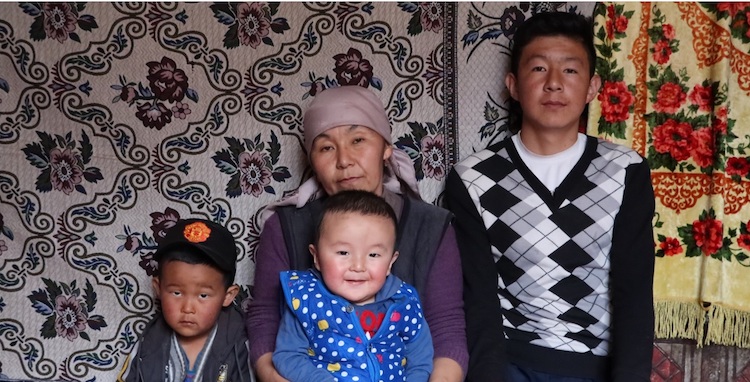By Aqila Hassanzada*
NARYN, Kyrgyzstan (IDN) – Mairam Bibi says her sons will not follow in their father’s footsteps – an abductor who kidnapped a teenage girl and forced her into a violent marriage.
At the age of 41, Mairam is sitting in her small straw house telling the story so many women in Kyrgyzstan could tell.
One morning when she was a teenager, Mairam was going to school when an old car stopped in front of her. Two men ran out of the car and headed towards her. She was terrified.
She had heard the stories of ‘Ala Kachuu’, how young girls were getting kidnapped in their own hometowns and forced into marriage. She never thought she would become a victim of Ala Kachuu herself. In her dreams, she would study medicine and become a doctor so she can help people.
Two years ago, Mairam Bibi, head covered with a black scarf, was sitting inside her small straw house. Lost in her thoughts, Mairam was thinking about the summer of the year 2000, the day, she graduated from school. She had always dreamt of this day to come.
A sudden shriek sound of someone crying brought Mairam back to reality. She opened her eyes and looked down at her appearance; black dress with a scarf tied around her head, people surrounding her as her husband’s funeral feast is taking place.
Broke down with a sob of despair, Mairam realizes the man who destroyed her life is now dead. “I don’t know whether I should feel happy or sad, my husband, the man who kidnapped me 17 years ago is now dead due to a heart attack,” she said.
Thinking about her husband, she laughed and said, “that man had abused me for years and I stayed quiet for the sake of my children. He was working in construction, earning some money with which I was able to feed myself and my children.”
Despite years of reporting to the police, Ala Kachuu – bride kidnapping – is still being practiced by the Kyrgyz community. A human rights researcher says, “the Kyrgyzstan government has not done enough to enforce bride kidnapping laws and stop the high rate of domestic violence against women and girls.”
A year after the death of Mairam’s abductor, another girl, named Burulai Turdaaly Kyzy was bride kidnapped. Later, in May 2018, she was murdered when she went reporting it at the police station. Since after her death, women in Kyrgyzstan have raised the illegal practice of Ala Kachuu on social media platforms to bring this issue to the international authorities. But one woman, who wanted to remain anonymous, said that most victims are forced to stay silent either by their abductor or for the sake of their family pride.
Hillary Margolis, a researcher at Human Rights Watch, said that the government has not done everything possible to enforce laws that would save women’s and girl’s lives. “Kyrgyzstan’s government cannot afford to shirk its responsibilities toward women and girls. It is leaving the door open for more women like Burulai to die while waiting for the laws promise to be fulfilled,” she said.
In the first three months of 2019, over 2,000 cases of domestic violence have been registered to police, according to Kyrgyz government data.
Human rights group stated on Radio Free Europe and Radio Liberty, that 60% of all cases contained physical violence because of bride kidnapping, a tradition practiced in Kyrgyzstan.
Every year, around 1,000 girls are abducted for bride kidnapping, according to the United Nations Development Programme (UNDP). There are no laws or safety measures taken by the government to stop the illegal practice of bride kidnapping.
The UN Committee on the Elimination of Discrimination against Women found after an inquiry published in September “into bride kidnapping” that a “culture of abduction, rape and forced marriage violates women’s rights in Kyrgyzstan,” and called on Kyrgyzstan “to strengthen its legislation and law enforcement, in particular by preventing, investigating, punishing and providing reparation for all crimes of abduction and related sexual violence.”
‘Ala Kachuu’ was outlawed in 2013, but in the name of tradition, Kyrgyzstani citizens are practicing it. Authorities acknowledge it can lead to violence including marital rape and trauma. Some communities say Ala Kachuu is a pre-Soviet tradition. Some even say that the attempt of bride kidnapping is based on tribal prestige. While interviewing women in Naryn, a victim of Ala Kachuu said, “bride kidnapping is considered a proud practice in the name of tradition.”
Currently, Mairam is raising her four sons with her husband’s pension. She also receives the fund for her children from the government which also helps her to buy essentials and pay the utility bills. Although she was the bride kidnapped and abused by her abductor – husband – Mairam is hoping she would be able to educate her sons and give them a better life.
Eyes with a ray of hope for her children, she says, “I will not let my sons follow the path of their father. My eldest son, Kuban, is 17-year-old and knows what his father did to me. And says, I will not harm or force any girl. I hope I will be able to see him getting married and having a happy family.”
* Aqila Hassanzada is a student of the University of Central Asia. [IDN-InDepthNews – 11 December 2019]


